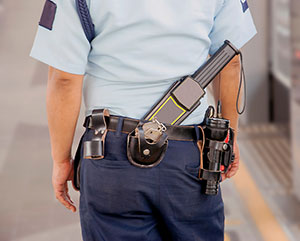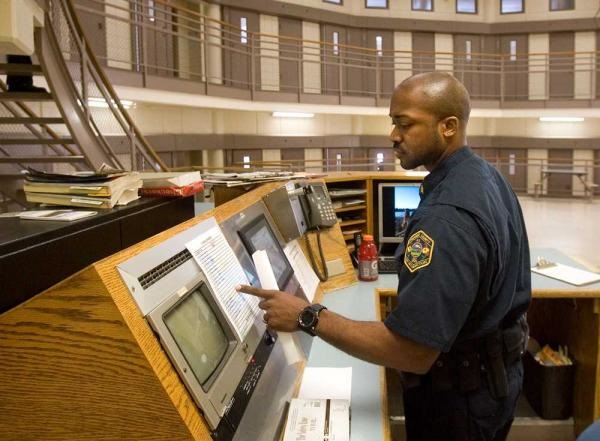It Takes a Tough Exterior and an Open Mind to Be a Correctional Officer

Being a CO isn't easy. By necessity, you need to keep inmates at arm’s length and harden up your calluses. Not for the sake of being cold but for good reason– for your own survival. For one, you can end up in jail yourself if you get too involved with inmates. For another, you're going to see people in bad situations making bad choices, and you have very little control over that.
Tre Hardiman filled us in on what it's like to be a CO. He got his start in South Chicago back in the '80s overseeing pre-trial detainees as a Sheriff’s Deputy correctional officer with the Cook County Department of Corrections.
One Man’s Story: Getting a Foot in the Door at the County Jail
Before he graduated high school in 1975 Hardiman knew he wanted to be in law enforcement. He wanted to be a warrant officer, but when he applied at the age of 18 he was told that first he needed to get a college degree and relevant training. He set to it, and a few years later had the qualifications he needed to get hired on with the sheriff's department. The first job that became available was for a correctional officer position. He decided to go for it.
Hardiman went through the training academy and learned all the rules and regulations about being a CO. “When I came through the door the training was specific, and the training was guided towards you doing your job and your job only. Nothing else.”
To a large extent, the training was the same that police officers got. Later on Hardiman would realize that the training in the '80s was lacking some of the nuanced explanation of how COs are supposed to interact with inmates. Back then, that kind of training available in no way prepared him for what he would encounter his first day on the job.
“What surprised me the most was the treatment of people… how many people were there. And really what surprised me the most was how many people I actually knew personally!”
Doing Time
His higher ups told Hardiman that once he gained a year of experience with the Cook County Sheriff's Department he could apply to move up to the job he really wanted: being a warrant officer. He ended up working as a correctional officer for four years.
During that time he learned many valuable lessons about being a CO and living to tell about it. “There's a certain amount of danger in any police position,” he says. “You'll encounter people who are locked up for a wide variety of reasons, from robberies and murders to rape and those incarcerated on procedural grounds.”
Hardiman found that being a CO changes people as they try to adapt to this environment both “mentally and physically.” In fact, Hardiman draws parallels between the way new COs change at work to the way new inmates change when they're incarcerated for the first time.
One of the first things to adjust to was just the physicality of the work. “You have to be built for this job, just like a football player,” Hardiman explains, “if you're not built you will be built.”
“Physically it's a hell of a job.” As part of the job you may have to, “wrestle, fight, defend yourself, hurt someone, or even get hurt.”
He also details how a person can change mentally as a correctional officer. If you were a caring individual before going in, after about a year you might not want to help anyone.
He explains that for COs, the cold hard truth is that you can't be compassionate for anyone who's an inmate. That's not the role of the correctional officer, and in many circumstances caring too much will create problems for you.
As realistic as he is, Hardiman isn't pessimistic about being a CO either. “You have to have a cold heart, but you don't have to have a cold mind.”
He explains that while you can't loan inmates money or contact someone on the outside, you can tell chaplains, drug intervention counselors, or other community or medical professionals that an inmate needs help with something.
Still, that doesn't make it easy. Reflecting on how some people cope while incarcerated, Hardiman notes…
“Jail has a tendency to make them hard if they stay there long enough.” COs see this process happen, and as much as they might want to, there's nothing they can really do about how an inmate handles being in jail. And all too often once an inmate's time is up, they're back five minutes later.
Hardiman thinks how inmates handle being incarcerated really just depends on the individual. “It's a revolving door to one extent, and it's a learning process to another extent, it could go either way.” For some inmates being in jail is a wake up call that they've got to do something different.
Corrections is Changing
Since the '80s when Hardiman started out as a CO he has seen a lot of positive changes in the correctional system. Back then he described a tendency for criminals to be seen as criminals, which contrasts with the present. “They're not looking at everyone as a criminal now, they're looking at the reasons they're a criminal.”
In 2008 the US Department of Justice found that inmates here experienced systematic civil rights violations under the Eighth Amendment. Those rights relate to cruel and unusual punishment, excessive bail, and excessive fines. And that’s the jail itself; so you can imagine how hard the inmates were.
Ten years later, the Cook County jail is looked to as an example of innovation and progress by many other outside agencies. However Hardiman remembers that, “at one time Cook County was no better than any other correctional facility – actually it was worse.”
Reflecting on today's main challenge for COs, Hardiman identifies overcrowding. It's not just a problem in Cook County; correctional facilities are overcrowded across the nation. In the Miami metro area's Broward County inmates are kept in glass cells the size of phone booths.
“You can only corral so many cows, and at one time there's going to be a stampede and everything breaks loose.”
No doubt running into people he knew from growing up in South Chicago on the other side of the glass made an important impression. Hardiman emphasizes that a lot of COs really have to care about the inmates they work with because they know that their friends and family members have been in the same situation.
Keeping this in mind, Hardiman says that working as a correctional officer is about a lot more than just swiping your time card.
When you get the job, don't take it at face value. Take it as a trust, where they're trusting you to do the job.
Regarding personal advice for new COs, Hardiman says that you've got to leave your job behind you when you come home each night. You'll gain a lot of valuable experience as a correctional officer that you can use to become a better CO and take with you to your next job.
Learn from your experience and separate yourself from your job when you're not working. Otherwise, “you'll have an attitude of a correctional officer that will ruin you for life if you don't let it go.”
As we wrapped up our interview, Hardiman had something to say about the common perception that after years of being a CO a person becomes jaded. He still believes, “You can't judge a book by its cover.”








